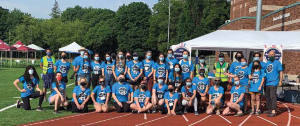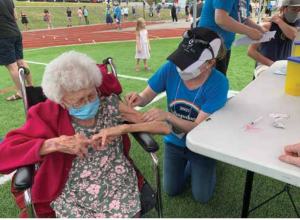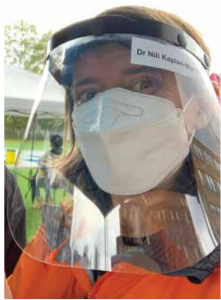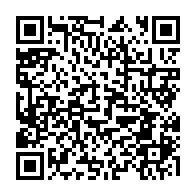
Team Jabapalooza gathers together on the Immaculata High School field to commemorate a busy day of grassroots public health.
Photo Supplied
Jabapaloozas: Taking COVID vaccinations to the street
By her own admission, Doctor Nili Kaplan-Myrth is outspoken, not the least bit shy and very comfortable with the media. During the pandemic, the Glebe-based family medicine practitioner has relied on these attributes and others to play a leadership role in the provision of COVID vaccinations to her patients and to vulnerable citizens of Ottawa through her mass community immunization events, known as “Jabapaloozas”.
After graduating from UOttawa med school, Dr. Kaplan-Myrth founded her Fourth Avenue family medicine clinic to provide “common ground collaborative care” to her patients, drawing from her prior studies in anthropology, indigenous health policy and politics, and self-determination health studies.
“My anthropological studies had shown me the importance of everything being a collaboration between the physician and the patient, and the merits of really working with the community. So that is what I’ve built over the last decade.”
Her five “Jabapalooza” mass outdoor COVID vaccination events, two of which were held recently at the Immaculata High School sports field in Old Ottawa East, have proven to be hugely successful, and have brought the fight against the virus directly to Ottawa’s urban core communities and to some of the city’s most challenged citizens.
In the following interview with The Mainstreeter, Dr. Kaplan-Myrth speaks frankly about some of the highs and the lows of the pandemic, as well as her life-saving role on the front-lines.
THE MAINSTREETER: Let’s start with the pandemic and your family medicine practice? How have you been affected?
DR. KAPLAN-MYRTH: When the pandemic began, we initially had to pivot to provide virtual care so that we could continue to see our patients safely from a distance, either by telephone or video. We were also trying to find sufficient personal protective equipment (PPE) since at the time there just wasn’t enough. Family doctors in the community weren’t supported at that point by the provincial government, so we didn’t have sufficient PPE. We also didn’t have any income to speak of between March 2020, and July 2020, so there was a lot of stress there. I was spending my days working pretty much 24/7, responding to calls from patients who were concerned that they had COVID. There was a lot to do taking care of my patients, evenings and weekends, and it was non-stop for those first months of the pandemic. At the same time, we were really unsure how our clinics would be able to survive financially. That was the point at which I picked up the phone and spoke to CBC and started writing articles in the Ottawa Citizen and The Mainstreeter and other community papers about the need to protect our vulnerable populations, people who don’t have access to health care, who just aren’t able to stand in lineups in order to get COVID tests. From there, we eventually got some PPE and we were able to open up our doors to see patients in our office, as well as by phone and video, and that really hasn’t stopped since September 2020. We have to do all of the regular family medicine, taking care of patients – immunizing babies, seeing people for their cancer screening, and all the other things that we do day-to- day. And we’re doing a lot of mental health counseling since people are struggling through the pandemic. Then, in Ontario, family doctors were entirely left out of any planning for the roll out of the vaccine. So I did a lot of advocacy for family doctors to be more involved, and then I started to gain access to vaccine in my own office, as did some other family doctors.
THE MAINSTREETER: How was it possible for family doctors like yourself to gain access to vaccines at a time when they were extremely scarce?
DR. KAPLAN-MYRTH: Actually, the province has never included us in the vaccine rollout. Family doctors across Ontario lobbied the province along with the Ontario College of Family Physicians. Then there were some pilot sites that were given vaccine, but those were primarily in Toronto and in other places, and not in Ottawa. Finally, it was just our dogged persistence that led us to being told, “Okay, you can have some doses of vaccine”. But the vaccine came from Ottawa Public Health (OPH), not the province, and OPH has been very supportive. They have been saying all along that they wanted the doctors to participate, but even Public Health was not invited to participate for the first several months of the vaccine rollout. It was all locked into hospitals, run by General Hillier at the time, and Public Health had no mandate. Finally, that shifted, and they were allowed to start doing immunizations, and then they invited us as family doctors to go and help immunize seniors in retirement homes. I was part of that first wave of family doctors who put up their hands and said I will go into retirement homes to immunize residents. And then, because I already had that experience, and because I was continuing to advocate along with my colleagues, a few of us initially were given the opportunity to receive some vaccine in our offices. But it still wasn’t supported by the province. Until very recently, the province said you can go to your mass vaccine clinics, or you can go to a pharmacy, but they hadn’t said you can also go to a family doctor. So it’s really been an uphill battle, which is very strange because it’s our bread and butter, it’s what we do – we do all of the immunizations. And when we were finally given the opportunity, we weren’t given very much vaccine, and we were only given Astra Zeneca. By that time, all of our 100-year olds, and 90-, 80- and 70-year-olds had already been vaccinated. The vaccine we were given was only for people, ages 40 and over. We only had a small number of patients from our office who we could vaccinate, so I decided to open it up to the public. I said okay, I’m going to start to email people who aren’t my patients who needed the vaccine.

One of more than 800 patients receives her COVID vaccine at a recent Immaculata High School Jabapalooza community vaccination event . Photo Supplied
THE MAINSTREETER: So, it was at that point that you then began your Jabapalooza events, is that correct?
DR. KAPLAN-MYRTH: Yes, correct. The first one, in April 2021, was held in front of my office on Fourth Avenue in the Glebe. I had about 80 to 100 of my own patients who still needed the vaccine, but then I took in others from the public, so I think we did 220 doses in that first Jabapalooza. The second one, in Old Ottawa East at Immaculata High School, we did about 330 immunizations, and the numbers kept going up, and we had 550 who attended our second event in Old Ottawa East. And as to overall numbers, we estimate the total number of individuals we’ve immunized at our Jabapaloozas is 2,640, and that would be a mix of first and second doses. Our first three events were all first dose immunizations, while the fourth and fifth ones were second doses. When we opened it up to the public we asked ourselves: “Okay, who are the people who are struggling, who cannot work inside their homes, who have to work outside of their homes, who have not been able to access a vaccine and who are exhausted from hunting, and who may be on multiple waitlists for pharmacies? At that point there were teachers, construction workers, bus drivers, truck drivers, early childhood educators, childcare providers, grocers, just so many different people who were struggling, and who needed to get the vaccine but who couldn’t just jump into a car and drive an hour away or couldn’t even get to a suburb of Ottawa. By having our Jabapalooza events in central Ottawa, we made it possible for people to get there by foot, by bike, or by OC Transpo. The second and the third events took place on the Immaculata High School soccer field. We had about a dozen medical students who volunteered, and about 30 people in the community who wanted to help, because there’s a lot of work that has to be done on the ground on the day of an event where you’re immunizing 500 people on a soccer field. The Ottawa Chamber Fest was there at the soccer field with us, serenading the patients all day long and they did a fantastic job creating beautiful music, and making it really special.
THE MAINSTREETER: How have you transitioned from the very beginning of these Jabapalooza events to where you are today, having successfully completed five of them?
DR. KAPLAN-MYRTH: What has changed is that we successfully lobbied for family doctors to be able to be involved in the rollout, though I’m not very hopeful that the province has heard the message that we should have been involved from the beginning. I’m delighted and proud that so many of my own patients have stepped up and have now had two doses of COVID vaccine. I’m very pleased that Ottawa Public Health has been supportive of family medicine. I’m so thankful for all the people in Ottawa who have volunteered to help to make our events successful and all the Ottawans who have gotten their vaccine and done what they can to stay safe throughout the pandemic. You know, it’s been a very hard year and a half for everyone, and we all want the pandemic to be over. Unfortunately, we’ve seen a lot of tragedy, a lot of people who have gotten sick and have died, and in particular so many of our seniors in retirement homes and in long term care. And, it’s extremely difficult for kids who haven’t been able to be in school. So, there are many for whom we need to grieve, but also we have this kernel of hope that we’re nearing the end of this. We just need people to stop shopping around for vaccine and take the first doses available to them.
THE MAINSTREETER: Dr KaplanMyrth, the actions you’ve taken to immunize Ottawans against COVID have gone above and beyond what would be considered routine within your profession. Would you agree?
DR. KAPLAN-MYRTH: I recognize that I’ve gone beyond what other family doctors may have done, but others have also been working tirelessly in their offices providing care. I’m outspoken, and I’m not shy, and I like writing and I’m comfortable with the media, so I just have to be in this role. Advocating for our patients and for our community and our population, it’s really part of our job as doctors, and I’ve done that a little bit differently than others have. But it’s because I believe so strongly that it’s an important role. And leadership is important at this stage, especially for women and particularly for scientists and for the medical profession, as the voices of experts. Early on, it was males, and predominantly white males, who were being portrayed as experts in health care, so we’ve been trying to amplify the voices of women and people of colour and people with disabilities and indigenous Canadians. We’ve been trying to say that the people who are working to take care of the community, all the community advocates who are out there every day without much support – they are, to my mind, the people who are really truly incredible.

Old Ottawa East’s business establishments offered generous donations, including these tents, to the two Jabapalooza events in the community. Photo Supplied
THE MAINSTREETER: When you speak of your problem being termed “front line heroes”, you described yourself as being rendered “dispensable”. What exactly do you mean by that?
DR. KAPLAN-MYRTH: Basically, the idea is, don’t call us heroes and then fail to support us. Nurses and personal support workers, and doctors and teachers, childcare providers, we’re all out there helping to keep the community going and working long hours and putting ourselves at risk, physically and emotionally by doing this work. And then there are no paid sick days for any of these people, and we have struggled to get adequate amounts of PPE, and doctors have had to close their offices because they couldn’t support themselves. Working as a family doctor, I had no one who went out of their way to support me or my colleagues. I had to travel 300 kilometres to get my own COVID vaccine because they forgot about us, because we don’t work in hospitals. I have been out there immunizing hundreds and hundreds of people, but for me to get my own vaccine, I have to travel that far – it’s simply absurd, and it’s hard to feel like a hero when our own well-being is hardly a priority for the province. So, we’re not interested in being pictured as superheroes because it suggests that you can withstand anything, that you have this superpower, and you’re somebody that should be glorified. But doctors and nurses and social support workers and others involved in this fight don’t want to be sent into battle without adequate protection.
THE MAINSTREETER: In connection with the Jabapalooza at Immaculata High School, were there any experiences that led you to form an impression of our community or the people who live in Old Ottawa East?
DR. KAPLAN-MYRTH: Well, it was all so special. We had the school ‘s principal, and the Footy Sevens organization, who reached out to us and said, come to Old Ottawa East. And they didn’t just give us their soccer field, they found tents for us, they helped us find chairs and tables. There were also two OOE businesses that prefer to remain anonymous, but they paid to rent the big 40 foot tent at the high school field that we needed to use to provide people some shelter from the rain for the event. Their assessment was to do whatever it takes in order to help immunize people so the pandemic can end, and then all the businesses can flourish again. I know who they are, but they do not want to be known, they prefer to remain anonymous. And there was the Happy Goat Coffee Company on Main Street and they said: “Hey, you know, the school is closed, so you won’t have facilities there, but you can come use our facilities – and not only that, but we’re also going to supply you with coffee and treats”. The Old Ottawa East businesses community was amazing, very, very supportive. And they were people I had never met before, these were total strangers who stepped up and said we’re going to make this successful for you. I mean we’re divided by that canal, but we’re all one community, right?




